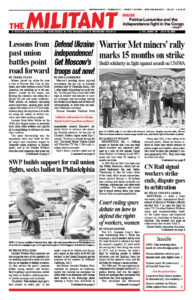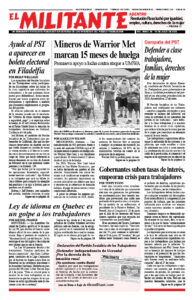Indigenous groups in Ecuador announced June 30 gains made after two-and-a-half weeks of daily protests and highway blockades, fighting for measures to protect workers and farmers from the ravages of inflation and other effects of today’s capitalist economic and social crisis.
“We didn’t win 100%, but we won something for all Ecuadorians,” Leonidas Iza Salazar, president of the Confederation of Indigenous Nationalities of Ecuador (Conaie), told a crowd of thousands in Quito, calling off further protests for now. Conaie leaders said they’re ready to resume their resistance if the government reneges on the agreements.
Iza noted that they had been demanding a 40-cent a gallon cut in diesel prices, which have nearly doubled over the last two years. Ecuador President Guillermo Lasso had at first offered a 10-cent cut, but then agreed to 15 cents, to $1.75 a gallon.
The government agreed to discuss additional fuel subsidies for hard-hit sections of the population, including small farmers and fishermen. It also cut the price of cooking oil by 20% and agreed to lower the prices of other basic necessities. Nearly one-third of the population lives on less than $3 a day.
Monthly payments to some 1.4 million families were increased from $50 to $55. Small and medium farmers will get a 50% subsidy for the purchase of urea fertilizer. Delinquent loans of up to $3,000 for farmers are forgiven and the interest rate on agricultural loans from the state bank was cut in half, to 5%.
The government also agreed to halt expansion of oil drilling zones and to ban mining in traditional Indigenous-protected areas and promised to consult with Indigenous communities on future projects.

